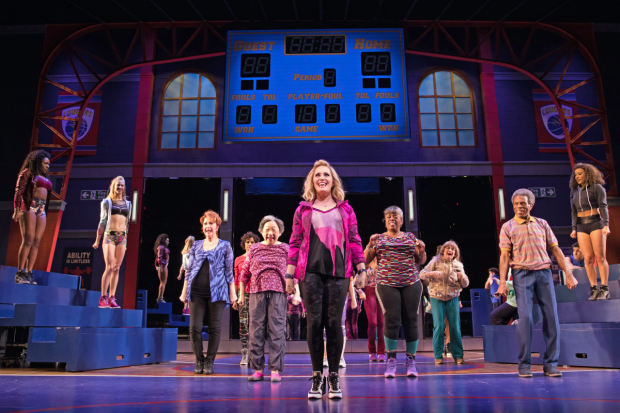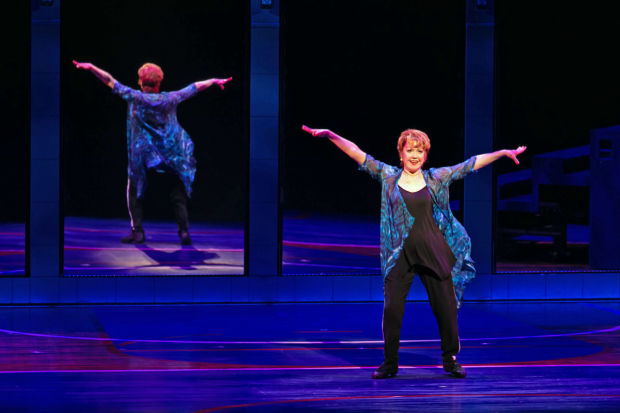The Music and the Mirror and the Chance to Dance in Half Time
Paper Mill Playhouse mounts a musical about a dance team of senior citizens.

(© Matthew Murphy)
If you ever wondered what happened to Cassie after she retired from the chorus line, you can find her popping and locking in the Nifty Shades of Gray — the senior citizen dance team represented onstage in the new musical Half Time, now running at Paper Mill Playhouse.
Director Jerry Mitchell fittingly recruited A Chorus Line's Tony-winning dancer Donna McKechnie to portray the next chapter in Cassie's journey — only here she takes the form of Joanne. Joanne, in actuality is based on 1952 Miss Subways Peggy Byrne, one of the original NETSational Dancers featured in Dori Berinstein's 2008 documentary Gotta Dance, which inspired the musical. But McKechnie may as well be singing the sequel to "Music and the Mirror" as she performs "Too Good For This" before set designer David Rockwell's wall of descending mirrors. Perhaps Joanne — a onetime Broadway veteran of a musical called Bongos at Noon — eventually comes around to the camaraderie of her unorthodox dance troupe. But I can't help but believe that somewhere Cassie is amening McKechnie's repeated lyric, "I'm too good for this sh*t."
Half Time boasts an acclaimed team of writers who have yet to unlock the story of vitality and community that caught Berinstein's eye. Book writers Bob Martin and Chad Beguelin grab low-hanging fruit with jokes about misplaced sweaters and poor eyesight while leaving behind opportunities to develop the specific relationships between teammates — the very thing that makes team narratives so addictive. Instead, Martin and Beguelin borrow the documentary structure to tell the story of the New Jersey Cougars (a fictionalized version of the New Jersey NETS), who, as a PR stunt, form a hip-hop dance team of women (and one man) over 60 to perform a center court show in a few weeks time. Characters are separated into isolated chapters, which may work in a documentary (and in A Chorus Line), but in this case the result is emotional divestment, a piecemeal score, and a long runtime.
Aside from Joanne, there are a handful of individuals we get to know thoroughly. Bea (Lillias White) is grandmother to Cougarette Kendra (Nkeki Obi-Melekwe), with whom she drives to and from rehearsal while preaching about healthy relationships in the grating and frequently reprised song "Princess". Camilla (Nancy Ticotin) is a cougar in the other sense of the word, with a specialty in salsa dancing (she tears up the floor in her song "Cómo No?" Mae (Lori Tan Chinn) is a joyful woman who dances to cope with her husband's failing memory (a struggle depicted in the awkwardly placed song "The Waters Rise"). Ron (André De Shields) is the self-proclaimed "Prince of Swing" and the only man on the team, which is oddly never addressed. And finally, Dorothy (Georgia Engel, whose soft, deliberate voice can deliver any line) is a mild-mannered kindergarten teacher with a penchant for down-and-dirty rap.
Meanwhile we also have the story of Tara (Haven Burton, the unexpected standout despite the roster of heavy hitters listed above), the ladies and gentleman's dance coach who was axed from the Cougarettes when she turned the ripe old age of 27. What begins as a begrudging job turns into a mission to defend her dancers' integrity against corporate monsters who want to turn them into a joke, and champion those who have been tossed aside and forgotten.
Which brings us to the theme of hip-hop. The Nifty Shades of Gray (eventually renamed the Nu Hip Crew) are told to channel their inner demons to connect them to the marginalized soul of hip-hop — a soul that composer Matthew Sklar and lyricist Nell Benjamin never fully channel themselves. Mitchell does a slightly better job with his simplified but still lively choreography and aside from their dance uniforms, costume designer Gregg Barnes seems to have the most fun dressing Engel in high collars and math sweaters.
Hip-hop songwriter Ester Dean, who was recruited to pen the show's finale, gives it the final burst of energy it needs. But a big part of the music's catharsis comes from its build-up: the building pressure of love, anger, betrayal, and dozens of other emotions swirled into an indecipherable mess. If you're going to hang your musical on that spirit, the middling orderliness of Half Time has to be benched.

(© Jerry Dalia)








